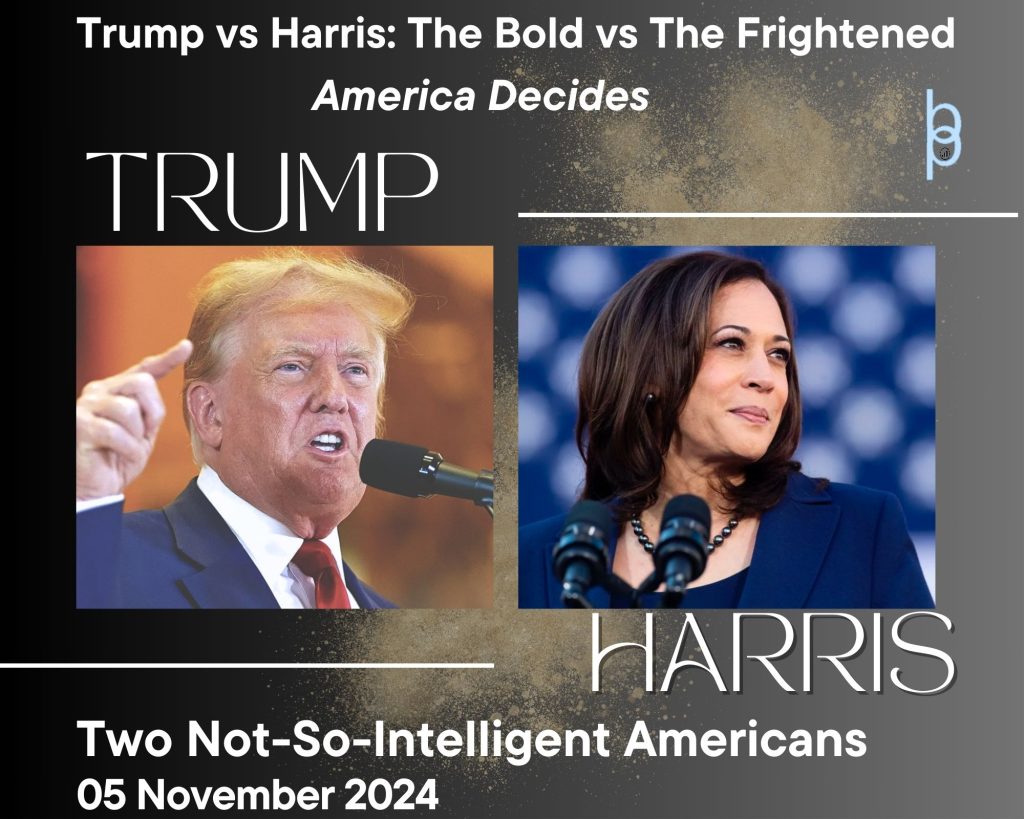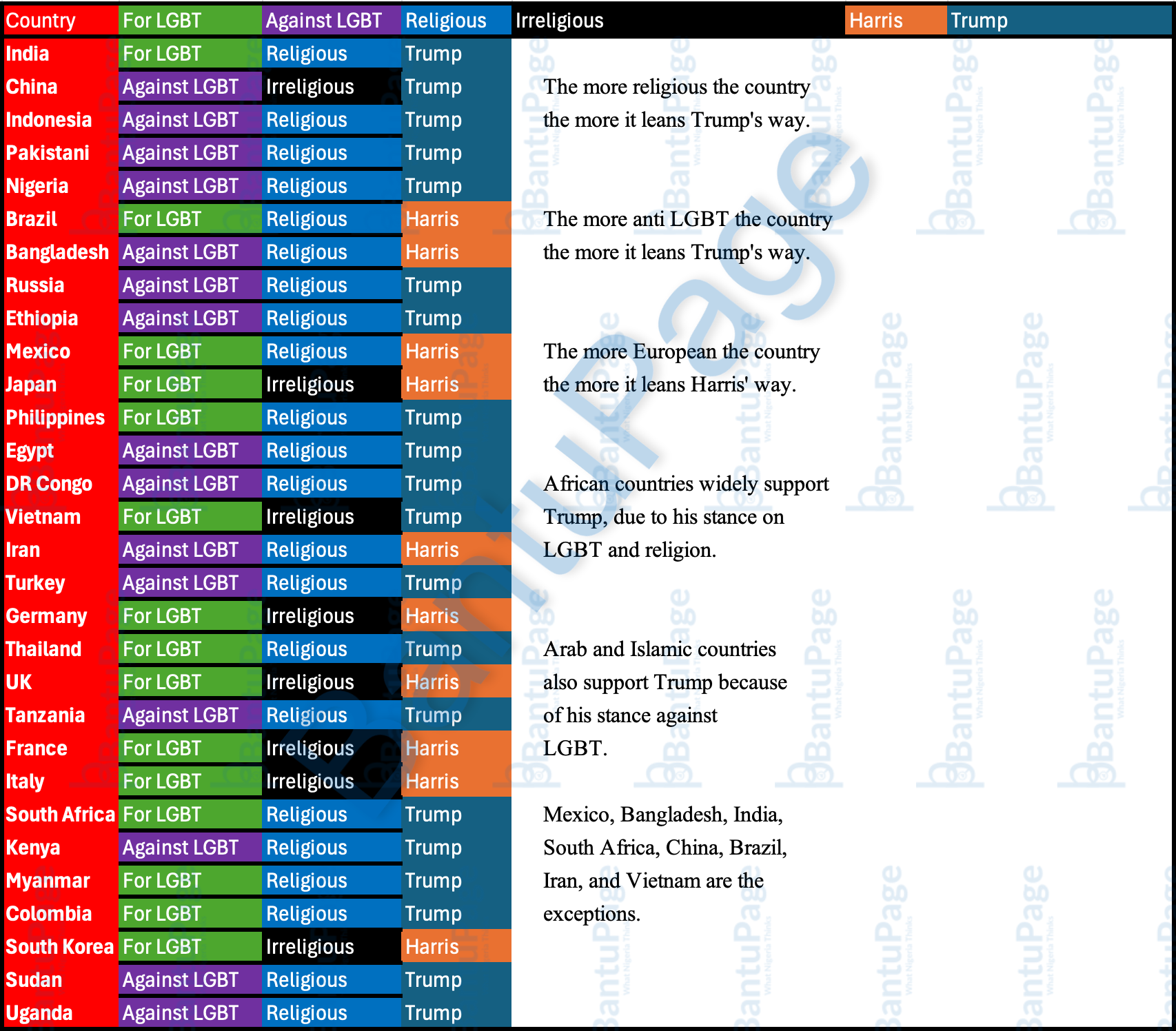
Support for Trump/Harris by the World’s Top 30 Countries by Population
This analysis only includes countries with a population of 50 million or more.
Trump/Harris Support Overview:
Outside of the United States, support for Kamala Harris tends to come predominantly from white Europeans, while black Africans, South Asians, and Arabs are more likely to support Donald Trump. Far Easterners who are allies of the US often favour Kamala Harris.

Religion:
Religious individuals generally lean toward Trump due to his open support for religion. However, he has maintained a tough stance against Islam at times. Interestingly, many Muslims still support Trump despite his criticisms. Strong anti-LGBT sentiments in many Muslim communities often lead them to support a candidate who shares their views on LGBT issues, even if they perceive that candidate as an adversary.
Exceptions:
Some notable exceptions include Mexico, Bangladesh, India, South Africa, China, Brazil, Iran, and Vietnam. Bangladesh prefers the status quo due to Trump’s criticisms of Hindu treatment in the country. The long-standing feud between Muslims and Hindus in Bangladesh and India complicates support; while Hindus in India overwhelmingly support Trump, Muslims in Bangladesh typically back Harris. Pakistan, being a predominantly Muslim country, supports Trump, which stands in contrast to the situation in Bangladesh.
Mexico presents a complex scenario due to its pro-LGBT and pro-religious stance, but it also supports Harris. The primary reason is that Trump has threatened to impose a 100% tariff on Mexican automobile factories due to their agreements with China. Harris is seen as a candidate who would maintain stability, which Mexico prefers. Brazil is in a similar situation, leaning toward Harris due to its pro-LGBT stance and alignment with the current leftist president, Luiz Inácio Lula da Silva, who shares ideological common ground with US Democrats.
China’s government favours the status quo, as Trump’s trade policies have adversely affected its economy. However, the Chinese populace may prefer Trump, as his conservative views align more closely with traditional Chinese values than those of leftist Kamala Harris.
Africa:
Africa has little to lose politically; thus, its support for either candidate is largely symbolic. However, support for Trump is noticeable, especially in Nigeria, where religion plays a crucial role in society. Nigerian support for Trump stems from his alignment with their religious values, outweighing concerns over his policies. In contrast, South Africa is more progressive, supporting both LGBT rights and Trump while critiquing perceived ideologies imposed by the Democratic Party. South Africans show strong support for the Palestinian cause, a sentiment driven by their historical experiences with apartheid and their opposition to US support for Israel.
Europe:
The divide between Eastern and Western Europe primarily reflects the differences in political ideologies, specifically between right and left. Eastern Europe tends to be more religious, while Western Europe has largely moved away from religiosity. Countries like Hungary are staunchly right-leaning, with strong religious values. Although Hungary is not as religious as some African nations, it exhibits significant disapproval of LGBT rights and robust support for conservative values. Other Eastern European countries such as Poland, Slovenia, Romania, Czechia, and the Baltic states share similar characteristics.
In contrast, Western European nations like Germany, France, Sweden, the Netherlands, and the United Kingdom maintain a left-leaning political stance that often contradicts the positions of their Eastern counterparts. One area of agreement, however, is the support for Ukraine amidst its conflict with Russia. Despite these differences, there seems to be considerable support for Kamala Harris, driven by a desire to maintain support for Ukraine, especially since Trump has indicated he would end such support.
The dependency of Europe on the United States has exposed weaknesses within its defence and political strategies. For too long, Europe has relied on American support. However, it may need to develop its own independent defence and political strategy that aligns with genuine European values rather than being opposed to the US. Canada shares more similarities with European nations than its neighbour, the United States. Similarly, Japan, South Korea, Taiwan, and Australia reflect values akin to Canada and Europe’s. While the latter two are more conservative, their political and economic future aligns with the values of Europe, Canada, and the Democratic Party. A Trump presidency could disrupt policies established decades ago to deter Russia and China. The rise of BRICS, supported by China, India, and Russia, poses a potential threat that could undermine the economies of these countries.
Regardless of the outcome, change is inevitable in Washington. A Trump victory would accelerate such changes, while a win for Kamala Harris would result in a more gradual shift, promoting stability, which many economies seek. Sudden policy changes could disrupt economic progress and deplete global capital. Nonetheless, a Trump presidency may benefit the American economy. Are we faced with Trump’s tariff policies or Harris’ continuation of the status quo?
By Ikechukwu ORJI





